#laurence tribe
Text
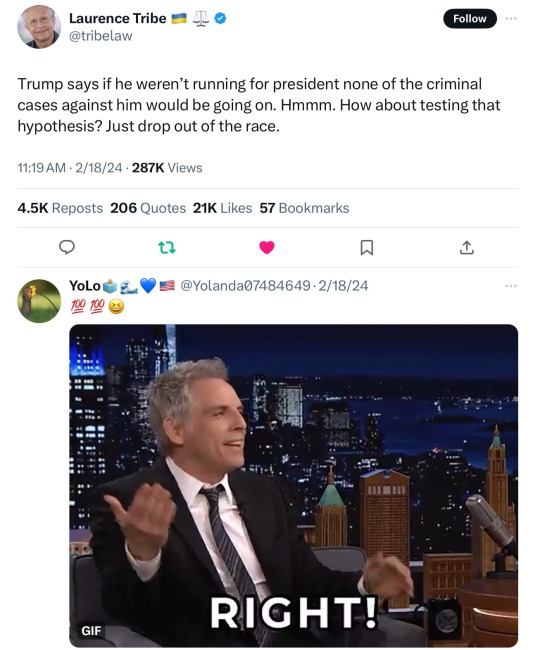
191 notes
·
View notes
Text
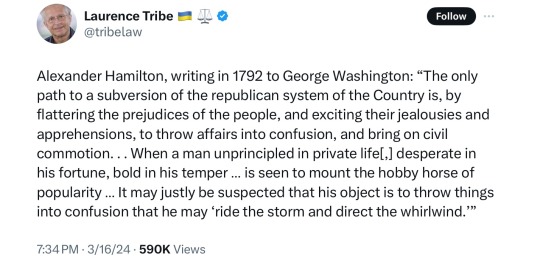
#Laurence Tribe#george washington#traitor trump#republican assholes#crooked donald#republican hypocrisy#republican values#republican family values#resist#traitor#never Trump
68 notes
·
View notes
Text
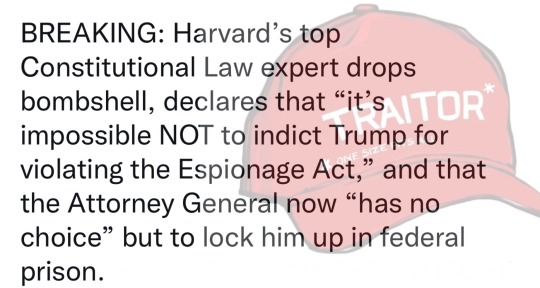
Harvard Law professor emeritus, Laurence Tribe, said that it will be impossible for Attorney General Merrick Garland not to charge former President Donald Trump.
Tribe said, “What it all means is that quite apart from whatever indictments coming down from Georgia, and quite apart from whatever indictments come down from attempting to overturn the election and fomenting a violent insurrection, it’s impossible not to indict Donald Trump for violating the Espionage Act.”
He continued, “For violating it for withholding top secret and government information knowingly, willingly after being advised by his lawyers that these documents had to be returned to the government and for doing that in an unsecured location. That is a very serious crime, not just a technical crime. It’s not just a matter of some dispute over storing things in one locker rather than and other. this is espionage, and it endangers the security of the United States. so Merrick Garland won’t have any choice. He used to look like a hard decision form, now it’s quite an easy one. It’s going to be tough for the nation to swallow but even tougher for all of us, in the long run, would be to swallow the specter of someone violating the national security laws of the United States and getting away with it. That just can’t be the law, and I think what we saw in a serious courtroom today presided over by judge who knows what he’s doing, what we saw is a glimpse of what is going to come down. And that is, Donald Trump will finally, for the first time in his life, be held accountable. I think the United States will be the better for it.”
#politics#republicans#donald trump#espionage act#laurence tribe#traitors#trumpublicans#treason#tre45on
217 notes
·
View notes
Text
Judge Aileen Cannon on Thursday overruled the special master she appointed to review thousands of documents seized from Mar-a-Lago, shielding former President Donald Trump from addressing his claims that documents may have been "planted" or "declassified" in court.
Cannon, a Trump appointee in southern Florida, issued an order extending the timeline of the review after Trump's lawyers objected to the expedited schedule laid out by special master Raymond Dearie, who was chosen from a list proposed by Trump's lawyers. Under the new order, the review and any surrounding issues around Dearie's rulings "will almost certainly" stretch into next year, according to Politico.
Cannon, who has served on the bench for less than two years, also overruled Dearie, a Reagan appointee who has served for 36 years, on his requirement that Trump assert whether the FBI's inventory of seized items is accurate, effectively challenging his public claim that agents may have "planted" evidence.
"There shall be no separate requirement on Plaintiff at this stage, prior to the review of any of the Seized Materials, to lodge ex ante final objections to the accuracy of Defendant's Inventory, its descriptions, or its contents. The Court's Appointment Order did not contemplate that obligation," Cannon wrote.
She wrote that if any issues rise during the review "that require reconsideration of the Inventory or the need to object to its contents, the parties shall make those matters known to the Special Master for appropriate resolution and recommendation to this Court."
Cannon also rejected other parts of Dearie's plan for the review, giving Trump's lawyers additional weeks to assert whether they believe any documents are covered by attorney-client privilege or executive privilege.
"If Judge Cannon was going to continue calling every ball in Trump's favor, I'm not at all sure why she felt the need to appoint a special master to review the documents the government seized from Mar-a-Lago," tweeted Joyce Vance, a former U.S. attorney. "No real surprises here. The name of the game is delay. Judge Cannon countermanded Judge Dearie's streamlined schedule & helped Trump advance his usual delay game in litigation. That means it could be late December before DOJ can use documents it recovered from Mar-a-Lago."
Cannon previously came under criticism for repeatedly siding with Trump in the case. Cannon's initial order barred the Justice Department from continuing its criminal investigation into the documents and ordered documents marked classified to be included in the special master review and shared with Trump's lawyers. A federal appeals court overturned those rulings, arguing that she had abused her discretion and that Trump "not even attempted to show that he has a need to know the information contained in the classified documents."
Harvard Law Professor Laurence Tribe said that Cannon's order on Thursday was "clearly wrong."
"But she's a sideshow now that the Court of Appeals has lifted her injunction with respect to the classified documents," he tweeted. "On the eve of her stupidly extended deadline, DOJ should indict Trump and render her delays and game playing moot."
Former federal prosecutor Renato Mariotti said the order was a "minor win" for Trump.
"But this doesn't change the difficult position Trump is in," he added. "He still has to take a position regarding every seized document."
Some legal experts criticized Cannon for repeatedly intervening on Trump's behalf.
"She's an embarrassment to the federal judiciary," wrote conservative attorney George Conway.
"Cannon's latest order has neither law nor reason on its side," tweeted former U.S. Attorney Harry Litman. "Judges never micromanage special masters this way," he said.
Former federal prosecutor Andrew Weissmann, who served on special counsel Bob Mueller's team, said that the order was "one more piece of evidence that she is completely unfit to serve on the bench."
"What does Donald Trump have on Judge Cannon or her husband?" Weissmann wrote. "Something is SO off in her decisions (and the court of appeals said as much) that it is impossible not to ask this question in all seriousness."
Read Cannon's full order below:
Cannon overrules Dearie by Igor Derysh on Scribd
#us politics#news#salon#donald trump#judge aileen cannon#11th circuit court of appeals#fbi raid#fbi#department of justice#judge raymond dearie#special master#mar a lago#top secret documents#classified documents#politico#twitter#tweet#Joyce Vance#Laurence Tribe#Renato Mariotti#George Conway#Harry Litman#Andrew Weissmann#scribd#2022
67 notes
·
View notes
Link
By Bob Brigham
RawStory
June 21, 2022
One of America's leading constitutional law experts called upon Attorney General Merrick Garland to prosecute Trump under racketeering laws designed to combat the mafia.
Laurence Tribe, professor emeritus at Harvard Law School, has argued three-dozen cases before the United State's Supreme Court and taught constitutional law for over half a century. Tribe taught Garland at Harvard Law, where he also taught Barack Obama, Supreme Court Justice John Roberts along with Jan. 6 select committee members Jaime Raskin (D-MD) and Adam Schiff (D-CA).
"Today’s hearing makes clearer than ever how deeply Trump and his acolytes have already damaged democracy at the ground level, driving honest election workers into hiding and creating a vacuum that fascists are in the process of filling," Tribe said.
Tribe noted a quote from former FBI Assistant Director Frank Figliuzzi on MSNBC.
"This is all looking increasingly like a kind of criminal enterprise. Trump at the head, almost a capo of an organized crime family," Figliuzzi said.
"Almost?" Tribe asked.
"This calls for RICO charges," he said.
The Racketeer Influenced and Corrupt Organizations (RICO) Act was "passed by Congress with the declared purpose of seeking to eradicate organized crime in the United States," the DOJ explains.
"It is unlawful for anyone employed by or associated with any enterprise engaged in, or the activities of which affect, interstate or foreign commerce, to conduct or participate, directly or indirectly, in the conduct of such enterprise's affairs through a pattern of racketeering activity or collection of unlawful debt," the DOJ said.
Tribe listed a number of prominent names in the conspiracy, including RNC Chair Ronna Romney McDaniel along with attorneys John Eastman, Rudy Giuliani, Jenna Ellis, and Kenneth Chesebro.
99 notes
·
View notes
Text
2 notes
·
View notes
Text

#us politics#news#politico#us supreme court#scotus#roe v wade#Justice Samuel Alito#planned parenthood#Planned Parenthood v. Casey#justice clarence thomas#justice neil gorsuch#justice brett kavanaugh#justice amy coney barrett#justice stephen breyer#justice Sonia Sotomayor#justice Elena Kagan#Dobbs v. Jackson Women’s Health Organization#us constitution#Justice Ruth Bader Ginsburg#laurence tribe#14th amendment#us history#2022#biden administration#abortion is better than negligence#abortion is a human right#abortion is a right#abortion is not a crime#abortions#abortion bans
4 notes
·
View notes
Photo
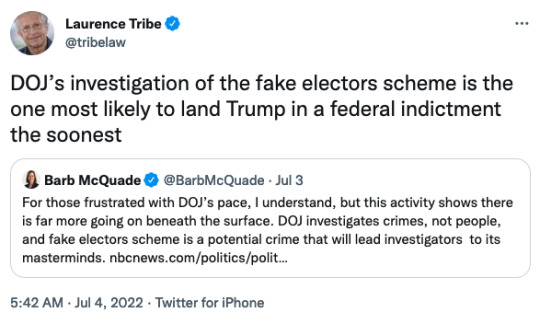
19 notes
·
View notes
Photo

https://twitter.com/tribelaw/status/1565018630982668291
2 notes
·
View notes
Text
Merrick Garland Must Go
By Arlen Grossman/ DailyKos.com/ February 25, 2024
President Joe Biden made a consequential and significant mistake when he appointed Merrick Garland to be Attorney General of the United States. Garland has turned out to be weak, clueless, and ineffective, to the point that his actions are currently endangering our very democracy.
At first Biden’s appointment of Garland seemed sensible. Most of…
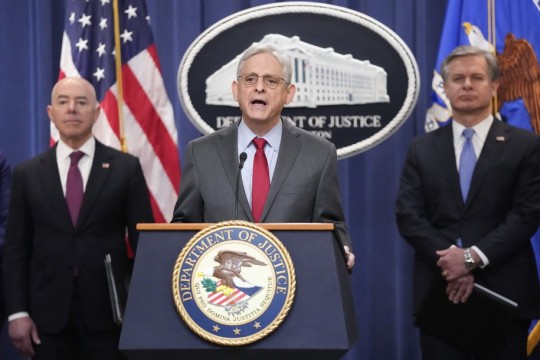
View On WordPress
#Amy Comey Barrett#Arlen Grossman#attorney general#fascism#Jack Smith#Laurence Tribe#Merrick Garland#Mitch McConnell#Robert Hur#Robert Kuttner#Robert Shrum
0 notes
Text
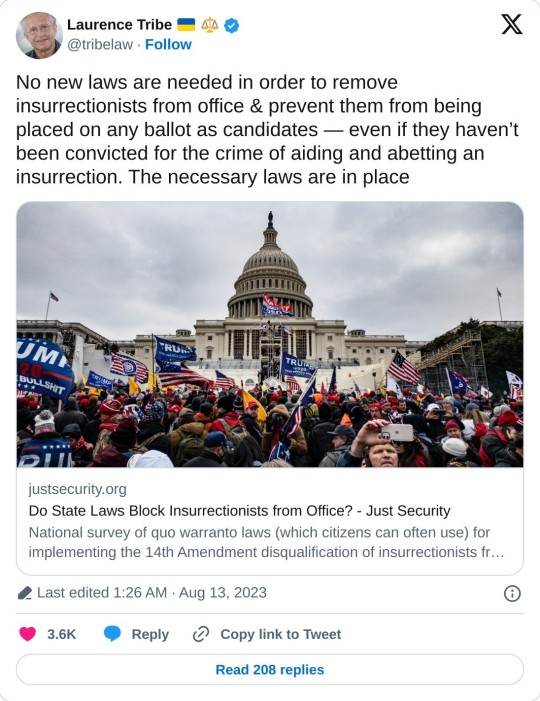
The next two years are likely to see a test of what may turn out to be the most legally consequential recommendation—other than the suggestion of criminal charges—made by the January 6 committee in its final report. Namely, the committee’s view that
“those who took an oath to protect and defend the Constitution and then, on January 6th, engaged in insurrection can appropriately be disqualified and barred from holding government office…pursuant to Section 3 of the Fourteenth Amendment.”
While the committee addressed congressional vehicles for enforcing that constitutional provision at the federal level, there are also existing provisions and processes to do so on a state-by-state basis. Those vehicles include states’ quo warranto laws. In this essay and our accompanying survey of those laws, we outline their applicability in all 50 states and four additional jurisdictions.
We come to this topic just over two years after a violent mob, alongside organized militia groups, stormed the Capitol building, the seat of American government. They disrupted the January 6 congressional certification of presidential electoral votes with the aim to overturn the 2020 presidential election. As a result, various institutions—from the Justice Department to Congress to civil society organizations—have been holding actors of all levels of culpability to account for the assault on our democracy. Over 900 individuals have been charged by the Justice Department in connection with the attack on the Capitol. Federal prosecutors have also secured historic, back-to-back seditious conspiracy convictions against leaders of the far-right Oath Keepers militia for helping foment the insurrection. And in December, the House January 6 select committee culminated their months-long investigation and series of public hearings by issuing several criminal referrals to the Justice Department against former President Donald Trump and some of his closest associates based on their involvement in different parts of the multi-prong effort to overturn the election.
But criminal prosecution is not the only means of January 6 accountability.
Section 3 of the Fourteenth Amendment can also serve that general purpose. Section 3 provides that no person shall hold any state or federal office “who[] having previously taken an oath…shall have engaged in insurrection or rebellion…or given aid or comfort to the enemies thereof.” In an initial detailed report published at the Project on Government Oversight, we examined the different avenues for modern-day enforcement of Section 3 with an eye toward holding accountable those who participated in the January 6 attack and in the events that precipitated it. As we discussed in that earlier analysis and an accompanying essay at Just Security, one of the main enforcement mechanisms for a Section 3 disqualification is a quo warranto lawsuit. (Quo warranto is Latin for “by what warrant.”) Through this type of lawsuit, an individual’s right to hold public office can be challenged.
Our purpose is to provide a comprehensive current survey of the nation’s quo warranto laws, and to build on the recent successful use of the doctrine. Despite that fact, the doctrine has been recently used to litigate against a public official who participated in the attack on the Capitol and resulted in his being removed from office. In that landmark ruling last fall, a New Mexico judge removed a state county commissioner from office under Section 3 for his participation in the January 6 attack. Since then, the House select committee in its final report has issued a recommendation that Section 3 disqualification actions be brought against other public officials who engaged in insurrection.
As a continuation of our previous analysis and the work of the House committee, we surveyed the quo warranto procedures in 55 different jurisdictions—the 50 states, the District of Columbia, Puerto Rico, Guam, the U.S. Virgin Islands, and nationally, including some limited instances of federal common law. We did so to map the potential for future uses of quo warranto lawsuits to bar public officials from office. Our analysis of these procedures demonstrates that quo warranto lawsuits can be used by a variety of stakeholders—from private parties such as individual citizens to public entities such as state attorneys general, county district attorneys, municipal or county governments, and even U.S. attorneys. What’s more, it shows that quo warranto lawsuits are an accountability tool that is not only widely accessible but also practically meaningful. Such actions hold the potential to disqualify sitting public officials who have violated their oath by engaging in insurrectionist activity. In that way, quo warranto lawsuits can serve as a powerful means of furthering legal accountability against some of the highest-ranking individuals who participated or aided in the assault on January 6.
Our analysis interprets the wide array of state and territorial laws that establish the procedural framework for quo warranto actions by categorizing them according to how they empower different parties, both in bringing actions and in managing them. In some jurisdictions, private parties can supply the government with information to serve as the basis of the government’s quo warranto complaint against a public official. These private parties are often referred to as “relators.” In Texas, for example, prosecuting attorneys may file a motion “at the request of an individual relator.” While such an action is not technically a private action, some jurisdictions also allow relators to manage a case pursuant to the government’s oversight. For instance, Missouri law empowers relators to control a case after obtaining leave from the prosecuting attorney.
In other jurisdictions, private parties can themselves file quo warranto lawsuits against public officials without governmental permission. Some jurisdictions, such as Connecticut, allow parties to do so in their own name. In others like North Carolina, however, the government must be the named party. In the latter scenario, the private party, not the government, manages the case; and, indeed, the government possesses no management authority. For example, should the prosecuting attorney decline to bring a quo warranto case in New Mexico, the relator is afforded full control of the suit despite the government being the named party. We identify both these types of quo warranto procedures as private actions, since both enable private parties to bring the suit.
Some jurisdictions have similarly codified which public authorities may initiate a quo warranto lawsuit. Unlike the regulations that empower private relators to issue broader complaints, many regions specify which authorities can litigate against particular officeholders. For example, in Arkansas, prosecuting attorneys may bring quo warranto suits against county officials, while the state’s attorney general handles cases against all other officers. Other jurisdictions such as Massachusetts and New York place the onus entirely on the attorney general, while others task other officials such as county or U.S. attorneys with bringing quo warranto suits.
Beyond empowering specific parties, quo warranto laws also impose other and highly varied procedures in these kinds of lawsuits. In New Jersey, for example, the attorney general carries the burden of proof. But in Hawaii, the respondent—that is, the public official whose conduct is in question—bears the burden of proof in lawsuits initiated by the attorney general. Other laws establish a duty upon public officials, usually either the local or state prosecutor, to bring a quo warranto action when, as in Arizona, for example, “they have reason to believe there is a cause.” California, Idaho, and Montana, to name a few, impose such a duty upon prosecutors.
Disqualification actions can be brought against public officials who have violated their oath of office by engaging in insurrection or by giving aid or comfort to insurrectionists. The House select committee recognized that in their final recommendations. Our comprehensive survey of quo warranto procedures is intended to serve as a guide to the various private and public stakeholders empowered by state and territorial law to file quo warranto lawsuits so they can continue the House committee’s work—holding public officials whom voters have entrusted to lead their government accountable for their wrongdoing.
#Do State Laws Block Insurrectionists from Office?#14th amendment#state election laws#insurrectionists#felons#office requirements for candidates#Laurence Tribe#constitutional law#constitutional law professor#Lawrence tribe#jan 6th
1 note
·
View note
Text
Can the Right Please Stop Taking God's Name in Vain?
The word "god" on the lips of hateful extremists is not just defiled, but it's drained of meaning, referring to nothing beyond themselves. #ChristianNationalism #January6th
Fra Bartolomeo, St.Dominic (c. 1506-7), Museo di San Marco, Florence.
How hath man parcel’d out thy glorious name,And thrown it on that dust which thou hast made …
— George Herbert, “Love (I)”
I sometimes meditate on a poem by George Herbert in my morning prayers, assisted by Helen Wilcox’s marvelous annotations [i] (the poet’s 17th-century idioms can be obscure for the contemporary…

View On WordPress
#Christian nationalism#Dobbs decision#Eric Bolling#George Herbert#Gilead#God#January 6 insurrection#Lara Logan#Laurence Tribe#Martin Buber#Newsmax#ReAwaken America#Robert McAfee Brown#Supreme Court#Taking God&039;s name in vain#Trump
0 notes
Text
A Horrendous Ruling ...
A Horrendous Ruling …
Are we getting tired yet? Are we sickened by all we see coming out of the extreme right, the former guy & his minions, and the exaggerated evangelicals? Would we like to just go somewhere ‘far away from the madding crowd’ and live out our days in peace? Yeah … me too. But guess what? That’s what they’re counting on … the right-wingers who would replace our Constitution with their bible, and…
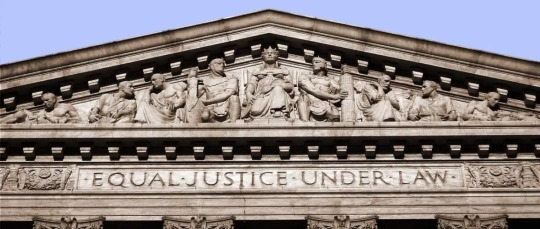
View On WordPress
#Judge Aileen Cannon#Laurence Tribe#Robert Hubbell#rule of law#stolen classified documents#the former guy#U.S. Department of Justice#William Barr
0 notes
Text
The Justice Department on Tuesday urged the Supreme Court to reject former President Donald Trump's appeal to have a special master review about 100 documents with classified markings that were seized from his Mar-a-Lago residence.
U.S. District Court Judge Aileen Cannon, a Trump appointee, last month named federal Judge Raymond Dearie as a special master to review documents seized from Mar-a-Lago and barred the DOJ from continuing its investigation into the 100 documents with classification markings. The 11th Circuit Court of Appeals overturned her order blocking the DOJ from investigating the documents but Trump filed an emergency appeal to the Supreme Court asking that the documents first be reviewed by Dearie.
Solicitor General Elizabeth Prelogar in a 34-page filing on Tuesday asked the Supreme Court to reject Trump's request, calling Cannon's initial ruling "an unprecedented order by the district court restricting the Executive Branch's use of its own highly classified records in an ongoing criminal investigation and directing the dissemination of those records outside the Executive Branch for a special-master review."
"The district court appointed the special master to review claims of privilege and for the return of personal property, but [Trump] has no plausible claim of privilege in or ownership of government records bearing classification markings," Prelogar wrote. "As the court of appeals recognized, [Trump] thus has no basis to demand special-master review of those records."
Trump's lawyers in his appeal argued that the 11th Circuit "lacked jurisdiction to review the special master order, which authorized the review of all materials seized from President Trump's residence, including documents bearing classification markings."
"Moreover, any limit on the comprehensive and transparent review of materials seized in the extraordinary raid of a president's home erodes public confidence in our system of justice," Trump's team wrote.
But Prelogar argued that Trump's lawyers never addressed the 11th Circuit's conclusion that Cannon's initial order "was a serious and unwarranted intrusion on the Executive Branch's authority to control the use and distribution of extraordinarily sensitive government records."
The 11th Circuit in its decision said that it "cannot discern why [Trump] would have an individual interest in or need for any of the 100 documents with classification markings."
The appeals court also pushed back on Trump's public claims that he may have declassified some of the documents he took home, writing that "the record contains no evidence that any of these records were declassified."
"In any event, at least for these purposes, the declassification argument is a red herring because declassifying an official document would not change its content or render it personal," a three-judge panel that included two Trump appointees wrote. "So even if we assumed that [Trump] did declassify some or all of the documents, that would not explain why he has a personal interest in them."
Trump's lawyers in their Supreme Court appeal referred to the documents as "purportedly classified" and insisted that as President he had "absolute authority" to declassify materials.
Prelogar in the Tuesday filing called the argument "wrong and irrelevant," noting that Trump "has never represented in any of his multiple legal filings in multiple courts that he in fact declassified any documents — much less supported such a representation with competent evidence."
Trump, the filing said, "has no plausible claims of ownership of or privilege in the documents bearing classification markings," and will "suffer no harm at all from a temporary stay of the special master's review of those materials while the government's appeal proceeds."
Harvard Law Professor Laurence Tribe said on Twitter that the DOJ filing is "utterly devastating" for Trump's case.
"It pulverizes all of Trump's arguments and leaves none standing," he wrote.
Trump's appeal only seeks a special master review of the 100 documents but doesn't ask to reimpose the initial order halting the DOJ's criminal probe.
"Why would they want to do that while permitting the criminal investigation to proceed? Well, it seems likely that they're still trying to figure out what was in those documents," former U.S. Attorney Joyce White Vance told MSNBC. "They want visibility on what the government has managed to reclaim from Trump. And there's a very inside baseball argument about jurisdiction, but the government most likely has the better part of that argument."
Lisa Rubin, a former attorney and MSNBC legal analyst, noted that the DOJ filing repeatedly took swipes at Trump's public arguments regarding classification, executive privilege and his authority to possess the documents.
"A clear, highly competent brief," Rubin tweeted, "that feels like a veteran kindergarten teacher calmly correcting a naughty kid."
#us politics#news#department of justice#11th circuit court of appeals#judge raymond dearie#judge aileen cannon#donald trump#mar a lago#fbi#fbi raid#top secret documents#classified documents#us supreme court#scotus#Solicitor General Elizabeth Prelogar#Elizabeth Prelogar#executive privilege#Laurence Tribe#Joyce White Vance#msnbc#Lisa Rubin#2022#salon
35 notes
·
View notes
Text
Harvard Law Expert Says Colorado Is 'Special' In Fight To Boot Trump From Ballot
Excerpt:
Tribe told MSNBC’s Ari Velshi on Sunday the lawsuit is the strongest challenge yet, in part because the plaintiffs “clearly have standing under Colorado law” and ironclad research backing up their complaint.
2 notes
·
View notes
Text
'There's a lot of people celebrating prematurely': GOP could bring a legal challenge to block Biden's student loan forgiveness plan
‘There’s a lot of people celebrating prematurely’: GOP could bring a legal challenge to block Biden’s student loan forgiveness plan
Arizona Attorney General Mark Brnovich suggested student loan borrowers shouldn’t bank on forgiveness yet, despite President Joe Biden’s announcement last month that he’d cancel up to $20,000 for many.
“I think there’s a lot of people celebrating prematurely,” Brnovich said. “A lot of other people are very upset about this, not only because of legal arguments, but because they believe it’s…
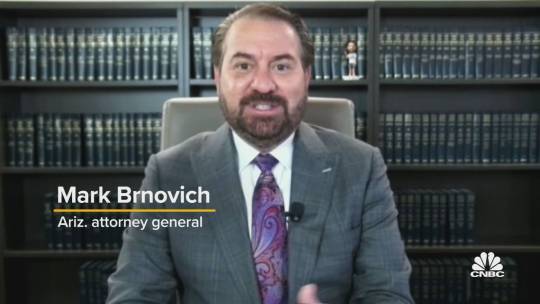
View On WordPress
#business news#Court decisions#Donald Trump#Education#Higher education#Joe Biden#Laurence Tribe#Personal finance#Personnel#Politics#Social issues#Student loans#Twitter Inc
0 notes